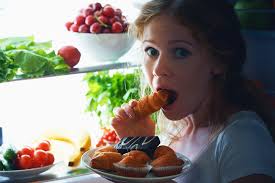Snacking after Dinner
Nutrition, January 15, 2018
Is poor habitual snacking after dinner preventing you from your body optimisation and performance goals?
Firstly are you having to snack due to not meeting your kcal requirements for the day? I would suggest that if you are "stomach" hungry and you have had a day when you have completed two sessions or had a particularly challenging (intensity wise or duration) key session then your body might require more nutrition. If this is the case then as long as you are snacking on good quality kcal without (eg (sweet) banana, cacao, chai and almond milk smoothie or (savory) tomato, avocado on quality crackers)
In some instances it can be due to tiredness, when you are feeling tired the body releases more hormones that make you hungry (ghrelin - hunger hormone) and slow release of hormones (leptin - satiety hormone) that make you feel satisfied. Research has shown that not getting enough sleep or poor sleep habits have been linked with a decrease in leptin, and an increase in ghrelin. Staying on top of your sleep is so important to stop this hormonal double tag team to increase your feeling to snack (please see my past article on the importance of sleep Wholistic Runner Part 2 - SLEEP https://everfit.co.nz/articles/wholistic-runner-part-2-sleep)
Here are some 5 ways to help with poor snaking habits after dinner
2) Hydrate - Drinking enough throughout the day means you are less likely to overeat. Simply put if you are drinking water instead of another kcal containing beverage it helps with overall weight management in the long term. Alcohol is the worst of all liquid kcal as it has an effect of stimulating food intake. Drinking adequate water is so important for all aspects of wellness, digestive health, temperture regulation; it literally maintains the health and integrity of every cell in the body.
4) Eat your VEGGIES and PROTEIN - Try and include vegetables as often as possible throughout your day. They provide fibre for fullness and a wide array of vitamins, mineral, and photo-nutrients to help with the bodies moment to moment biochemistry processes. Including good quality plant protein and fat creates satiety keeping you fuller for longer periods. This helps with the urge to snack. Some good examples of plant protein are tofu, temph, nuts, and a good quality powder. We use Garden of Life - Raw Organic Protein in smoothies (choc and vanilla flavour), and we bulk up soups and stews with the natural flavour.
5) Eat till 80% full - Eat slowly and mindfully. When finished wait for 20min before deciding on having a second helping. It can take the stomach 20-30min to send messages to the brain about it's state of fullness. The Okinawans (indigenous people of Ryukyu Islands in Japan) eat till they are 80% full. They are famous for having one of the longest life expediencies in the world. This rule is called "Hara Hachi Bu".

.jpg?version=8)